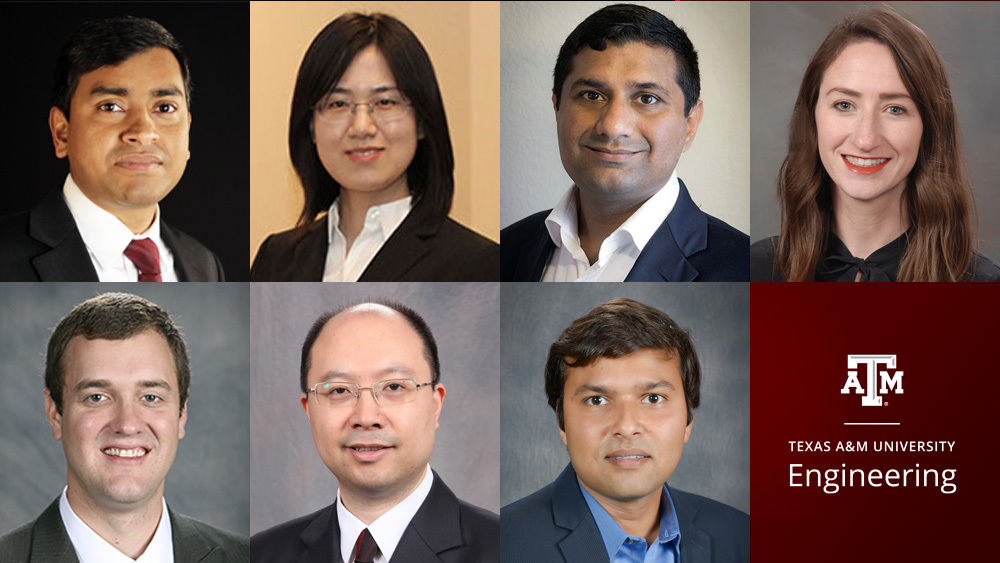
Seven engineering faculty members at Texas A&M University received Faculty Early Career Development Program (CAREER) Awards from the National Science Foundation (NSF) for their 2020 funding cycle.
The NSF CAREER program offers support to early career faculty who have the potential to serve as academic role models in research and education and to lead advances in the mission of their department or organization. Activities pursued by early career faculty are expected to build a firm foundation for a lifetime of leadership in integrating education and research.
Each year, the NSF presents an estimated 500 CAREER awards totaling around $250 million to early career faculty at U.S. institutions of higher learning, museums, observatories, research labs, professional societies and similar organizations associated with research or educational activities.
This year’s recipients include:
Dr. Faruque Hasan
Assistant Professor and Kim Tompkins McDivitt ’88
Phillip McDivitt ’87 Faculty Fellow
Artie McFerrin Department of Chemical Engineering
Hasan’s five-year research project, “CAREER: Synergistic Design, Analysis and Learning of Intensified Process Systems,” aims to systematically detect and analyze the existence, emergence and role of hidden synergistic effects in complex systems.
Synergy is the combined effect of cooperative interactions between two or more organizations, substances or other agents that is greater than the sum of their separate effects. Wherever complex systems exist, there exists synergy or the potential for synergy. Hasan argues that studying and understanding synergies could unlock hidden potential across a wide swath of academic disciplines. “It (synergy) has a very transformative impact beyond chemical engineering,” said Hasan. “Biology, materials science, economics, business and education can all benefit from a deeper understanding of synergistic effects.”
Dr. Ruihong Huang
Assistant Professor
Department of Computer Science and Engineering
Huang’s five-year CAREER project, “Discourse Level Event-Event Relation Identification,” aims to create document-level event graphs that identify the relationships (e.g., temporal and causal relations) between events mentioned anywhere in a document in order to better contextualize real-world events and interpret how and why they happened, thus better supporting various event-oriented applications.
“Events tend to be described in a complex relationship with other events,” she said. “For example, a news article describing the events of a protest without information on why it was launched would be considered incomplete.”
Dr. Abhishek Jain
Assistant Professor
Department of Biomedical Engineering
Jain’s project, “CAREER: Modeling Human Veins and Venous Pathology With Organ-On-Chip Engineering for Basic, Translational and Educational Research,” will further his work to develop new disease models of veins to better understand how these unique structures help our cardiovascular systems function. Venous diseases are ranked amongst the top cardiovascular causes of death worldwide.
“We have the opportunity to advance this model to prevent future death from pandemics that are actually vascular diseases,” Jain said. “You could very quickly use these tools to find drugs, to find treatments. You can save lives by using these devices.”’
Dr. Stephanie Paal
Assistant Professor
Zachry Department of Civil and Environmental Engineering
Paal will use her CAREER award, “Leveraging Existing Knowledge and Artificial Intelligence to Understand the Performance of Civil Infrastructure Under Extreme Hazard Loads,” to leverage existing knowledge and artificial intelligence to understand the performance of civil infrastructure under extreme loads such as natural or human-made disasters like earthquakes, hurricanes or fires.
"I will focus specifically on the application of AI (artificial intelligence) techniques such as transfer learning by leveraging available relevant, large datasets to address the small datasets that are comprised by the development of these new materials and structural designs,” she said. “While my research goal focuses on augmenting human knowledge with the artificial, my education goal focuses on augmenting current practices with the physical."
Dr. Matt Pharr
Assistant Professor
J. Mike Walker ’66 Department of Mechanical Engineering
Pharr was awarded NSF support for his work, “CAREER: Electro-Chemo-Mechanics of Li and Na Metal: Toward Dendrite- and Damage-Free Metallic Anodes of Rechargeable Batteries.” His research is investigating lithium and sodium metal anodes and key alloys as potential components of next-generation batteries and how to overcome the challenges of safety and durability currently associated with these chemistries.
“While the electrochemistry of lithium and sodium has been studied extensively, at the heart of the issue lies a mechanics of materials problem,” Pharr said. “Unstable deformation occurs during operation, producing so-called dendrites and damage. Materials and mechanics-based studies are thus necessary to enable safe and durable operation.”
Dr. Yang Shen
Assistant Professor
Department of Electrical and Computer Engineering.
Through his project, “CAREER: Physics-Constrained Modeling of Molecular Texts, Graphs, and Images for Deciphering Protein-Protein Interactions,” Shen will work on computational methods to unravel how proteins interact in living systems, which will allow for a better understanding of how biological systems work. This can ultimately lead to the development of therapeutics to combat diseases or illnesses.
Shen will investigate protein-protein interactions so that researchers have a better understanding of how living systems function and how therapeutics can be developed for diseases. He is developing algorithms using machine-learning and artificial-intelligence techniques that will treat proteins as multimodal data from which patterns can be mined and insights can be discovered. “I am very excited that my ideas are supported and the project can be carried on because this is something I feel really devoted to and passionate about,” he said.
Dr. Ankit Srivastava
Assistant Professor
Department of Materials Science and Engineering.
Dr. Ankit Srivastava’s project, “CAREER: Constrained Slip, Cracking and Instability in Extremely Anisotropic Nanolayered Solids,” will focus on understanding and modeling microstructural-scale deformation and failure mechanisms in nanolayered crystalline materials. Some of these nanolayered materials hold tremendous promise for technologies where reliable performance is required under extreme environments.
“An integrated experimental and computational approach will allow us to understand and engineer fracture and instability in nanolayered materials to enhance their damage tolerance and enable their use in critical applications,” Srivastava said.